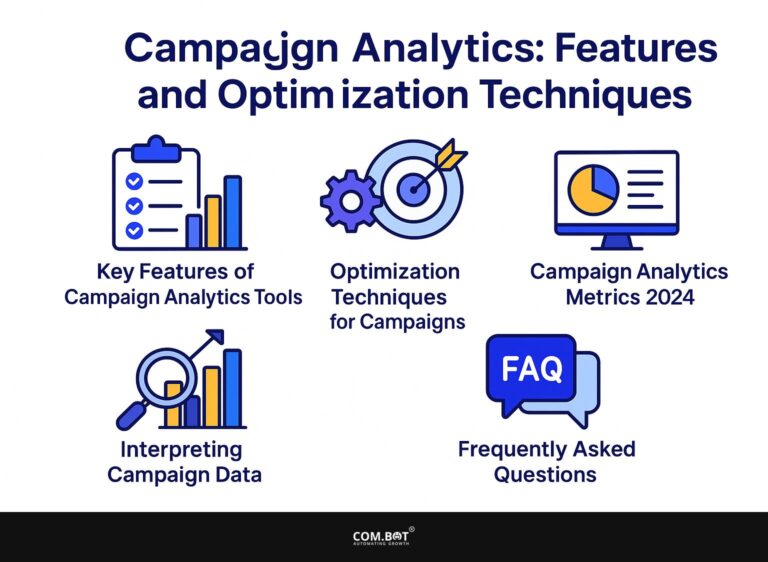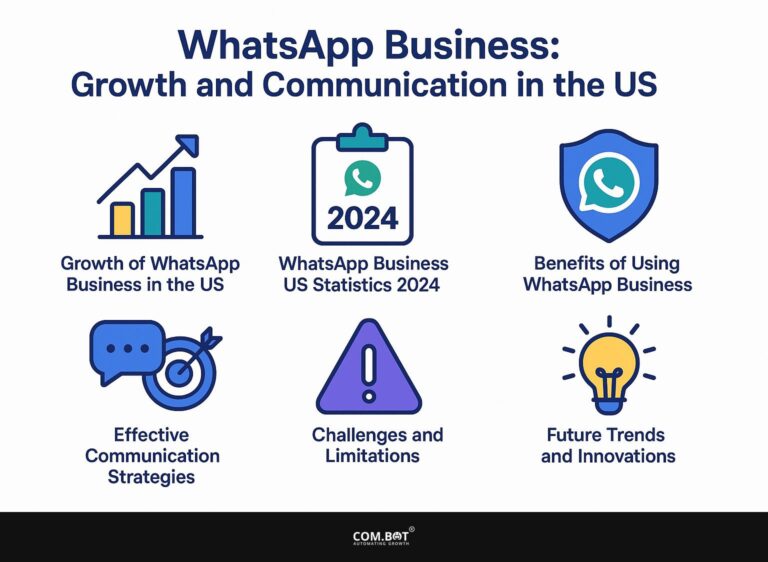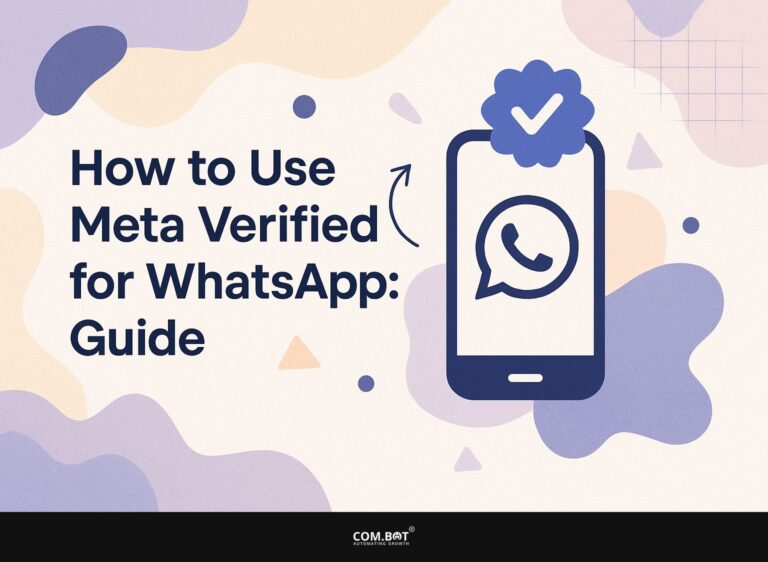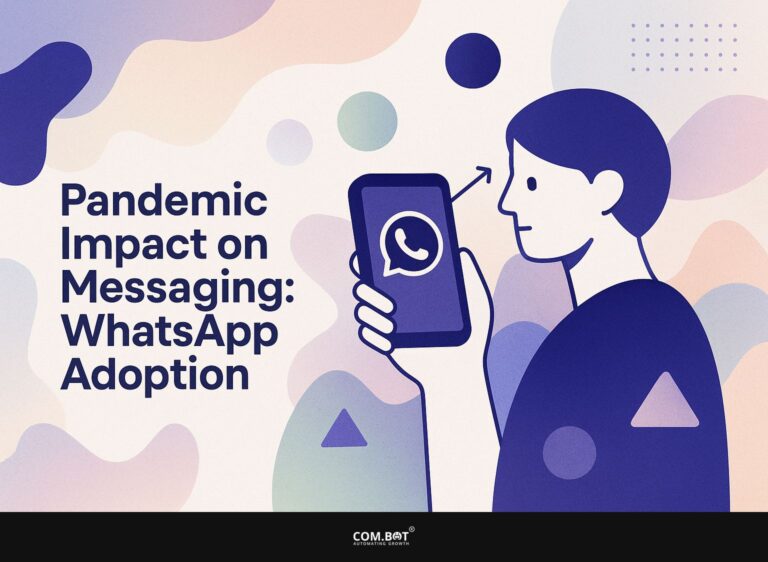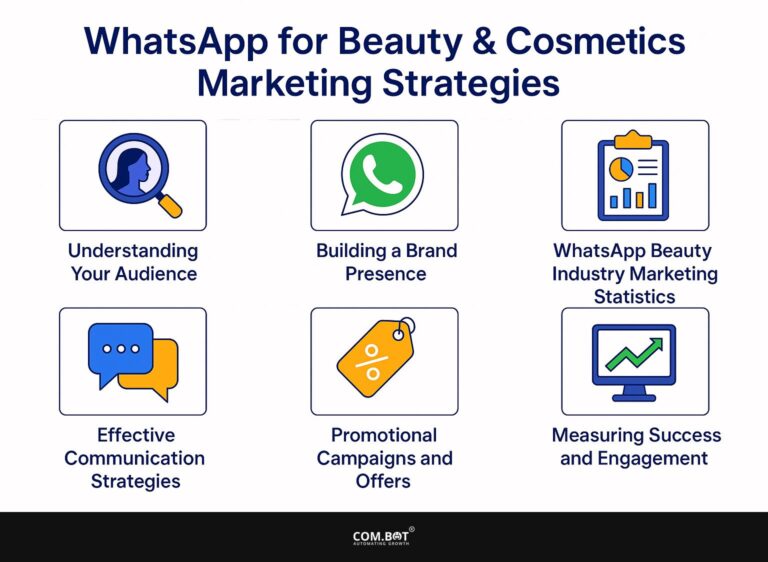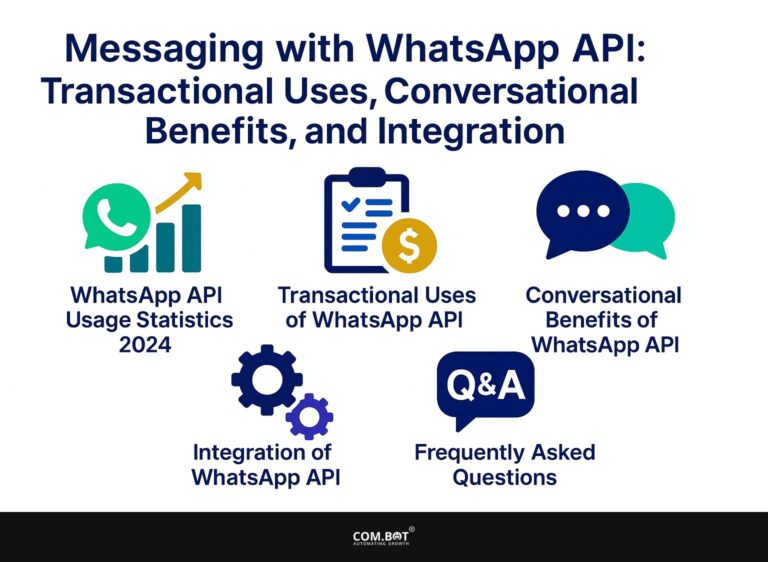WhatsApp CRM Integration: Applications and Third-Party Tools
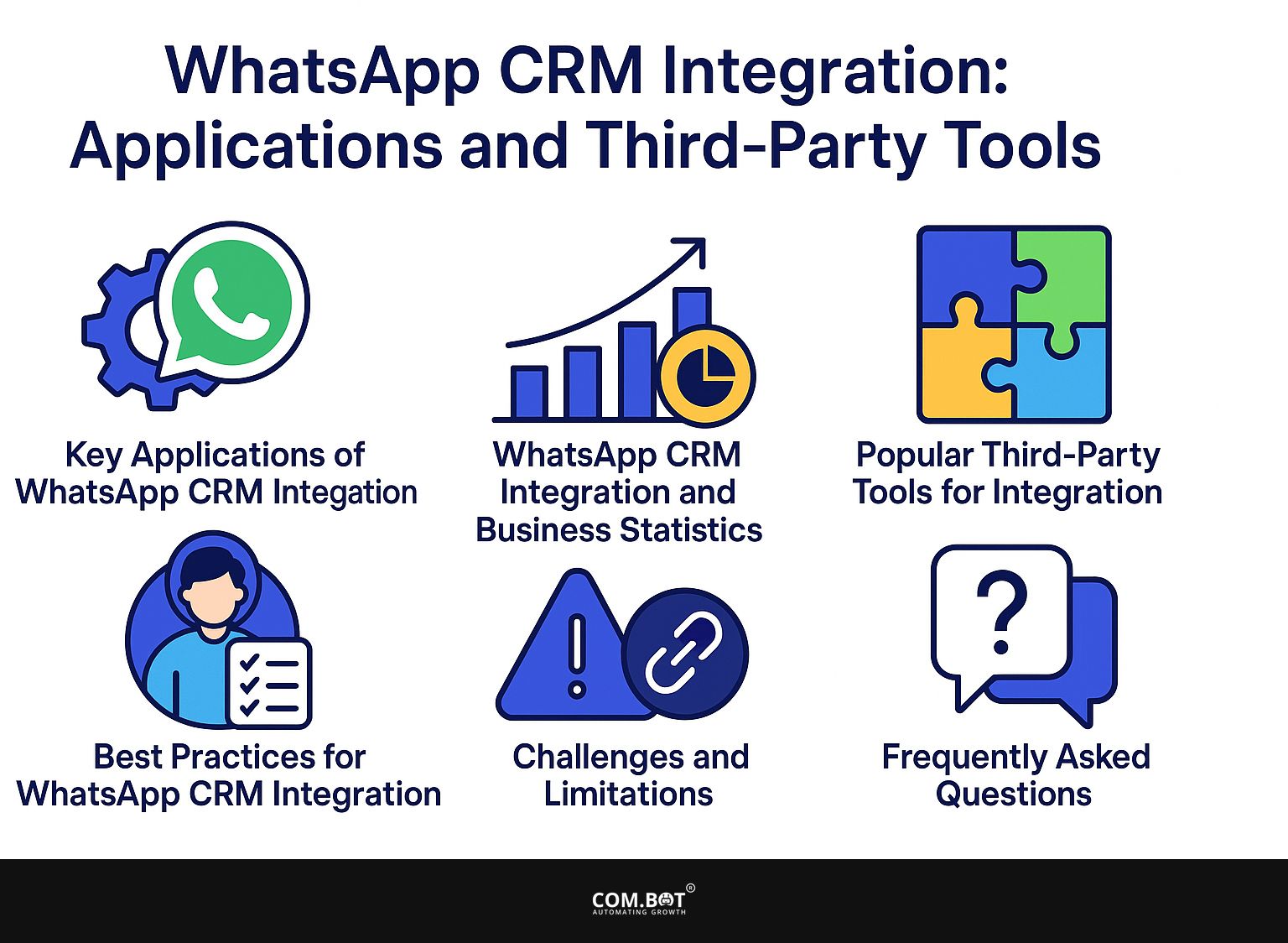
Using WhatsApp with CRM systems can change how businesses communicate with customers. By connecting platforms like HubSpot with WhatsApp, organizations can improve communication and build stronger customer relationships.
This article looks at how to use WhatsApp with your CRM system, focusing on the important tools you need from other companies. It shows you how to improve customer support, increase sales, and make marketing tasks automatic. Learn how this combination can help your business progress.
Key Takeaways:
- Increase customer interaction and simplify communication by connecting WhatsApp with a CRM system.
- Use WhatsApp CRM integration to handle customer support, sales, and marketing effectively. Employ widely used tools such as WhatsApp Business API, Zapier, and chatbots.
- Follow best practices such as protecting customer privacy and responding quickly. Be aware of compliance rules and integration challenges for successful WhatsApp CRM setup.
- 1 Key Applications of WhatsApp CRM Integration
- 2 WhatsApp CRM Integration and Business Statistics
- 3 Popular Third-Party Tools for Integration
- 4 Best Practices for WhatsApp CRM Integration
- 5 Challenges and Limitations
- 6 Frequently Asked Questions
- 6.1 1. What is WhatsApp CRM Integration and why is it important?
- 6.2 2. What are some popular applications for WhatsApp CRM Integration?
- 6.3 3. Can WhatsApp CRM Integration be used with third-party tools?
- 6.4 4. What are the benefits of using WhatsApp CRM Integration?
- 6.5 5. Is WhatsApp CRM Integration suitable for all types of businesses?
- 6.6 6. How can I get started with WhatsApp CRM Integration?
1. Importance of CRM Systems
CRM systems help businesses manage customer details effectively and allow personalized communication, leading to improved sales and service outcomes. Two prominent CRM systems, HubSpot and Salesforce, excel in data analytics and performance tracking.
HubSpot offers a no-cost version, allowing startups to use it. It generates reports about how customers act, helping companies adjust their marketing plans.
On the other hand, Salesforce provides strong features for big businesses, such as flexible dashboards and an AI-based analytics tool named Einstein Analytics. This enables detailed performance tracking and predictive modeling (our article on harnessing AI bots for business intelligence offers practical insights into these technologies). Choosing between these systems depends on your company’s size and specific needs for data analysis.
2. Benefits of Using WhatsApp for Business
WhatsApp gives businesses a way to communicate instantly with customers, improving interaction and building stronger relationships.
To maximize WhatsApp’s potential, businesses can implement the following strategies:
- Use broadcast lists to send messages to certain groups, ensuring customers receive updates relevant to them.
- Use chatbots to manage common questions and support requests, providing help at any time.
- Integrate multimedia sharing to showcase products effectively, such as sending product videos or images directly in chats.
Think about sending custom messages. They can greatly increase how often people read them-data indicates that custom messages can have a 98% open rate, resulting in better relationships with customers.
Key Applications of WhatsApp CRM Integration
WhatsApp CRM integration can be used to improve customer support, increase sales, and simplify marketing tasks, meeting various business needs. This integration aligns with the principles outlined in our analysis of WhatsApp API setup, which highlights its components and benefits for businesses.
WhatsApp CRM Integration and Business Statistics
WhatsApp CRM Integration and Business Statistics
WhatsApp Business Information: What Customers Like
WhatsApp Business Information: Business Interaction
WhatsApp Business Data: How People Use the Platform
The WhatsApp CRM Integration and Business Statistics show important information about how businesses and consumers communicate on the platform. The data highlights how important WhatsApp is for connecting with customers, providing support, and boosting sales. Businesses can use WhatsApp to strengthen customer connections and increase sales.
WhatsApp Business Insights show that 66% of customers prefer messaging businesses, highlighting a shift towards more immediate, personal communication. Similarly, 65% express confidence in messaging businesses, indicating trust in this communication method. Additionally, 67% of consumers expect messaging for communication, suggesting that businesses must change to meet customer service expectations.
- Business Engagement: A high 83% of businesses use WhatsApp for customer support, illustrating its effectiveness in providing quick responses and resolving issues. The 27% conversion rate Using WhatsApp for business conversations is important because it can increase sales through customized messages. Furthermore, the 500% growth in lead generation via WhatsApp chatbots shows the platform’s ability to handle and expand customer interactions quickly.
Platform Usage metrics reveal that 91% of daily active users engage on WhatsApp, underscoring its integration into users’ daily routines. With 69% of users influenced in their purchase decisions by WhatsApp Businesses can help consumers make purchases directly on the platform. The 99% open rate for WhatsApp messages is particularly impressive, indicating near-perfect reach and visibility for business communications.
Overall, these statistics show that WhatsApp is an important tool for businesses today to improve customer interaction and simplify their processes. By using WhatsApp well, companies can meet what consumers expect, increase conversion rates, and build stronger customer relationships, leading to more purchases and business growth in today’s online market.
3. Customer Support and Communication
Adding WhatsApp to customer support processes allows for fast replies and better communication, which improves customer service.
To make the most of WhatsApp, businesses can use tools like Freshsales, which works well with WhatsApp for monitoring customer interactions.
One of our most insightful case studies demonstrates how a retail company implemented WhatsApp for real-time updates on order statuses, resulting in a 25% increase in customer satisfaction scores. Another example is a tech support team that used WhatsApp for troubleshooting, cutting down response time from hours to minutes.
By giving quick replies and interacting instantly, businesses can build better connections with customers and increase loyalty.
4. Sales and Lead Generation
Using WhatsApp for sales can significantly increase the creation of leads and the rate of turning those leads into customers, making it a key tool for sales teams. A good method is to send custom messages to potential customers. Tailor your approach by addressing their specific needs and interests.
For instance, a local bakery could message customers about a new pastry flavor, inviting them to visit. It’s important to follow up; contact them a week later to ask if they liked the treat.
Real estate companies have effectively used WhatsApp to send property listings quickly, resulting in more interest and fast replies. By using these methods, teams can build genuine relationships and naturally attract potential customers.
5. Marketing Automation
WhatsApp works with CRM systems to let businesses send marketing messages automatically. This makes it easier to handle specific campaigns and increase interaction with customers.
To create automatic marketing campaigns on WhatsApp, begin by selecting a CRM system such as HubSpot or Zoho. Both provide ways to connect that can make your outreach more efficient.
For example, use HubSpot’s workflows to trigger WhatsApp messages based on customer actions, such as cart abandonment. Recent data reveals that sending custom automatic messages can raise engagement rates by as much as 98%.
For a deeper dive into maximizing engagement, explore our comprehensive guide on WhatsApp engagement strategies to boost sales effectively. You can use tools like Twilio to send messages quickly and on time. Start with clear goals and segment your audience for best results.
Popular Third-Party Tools for Integration
Several external tools allow you to link WhatsApp with CRM systems, enhancing functions and user experience.
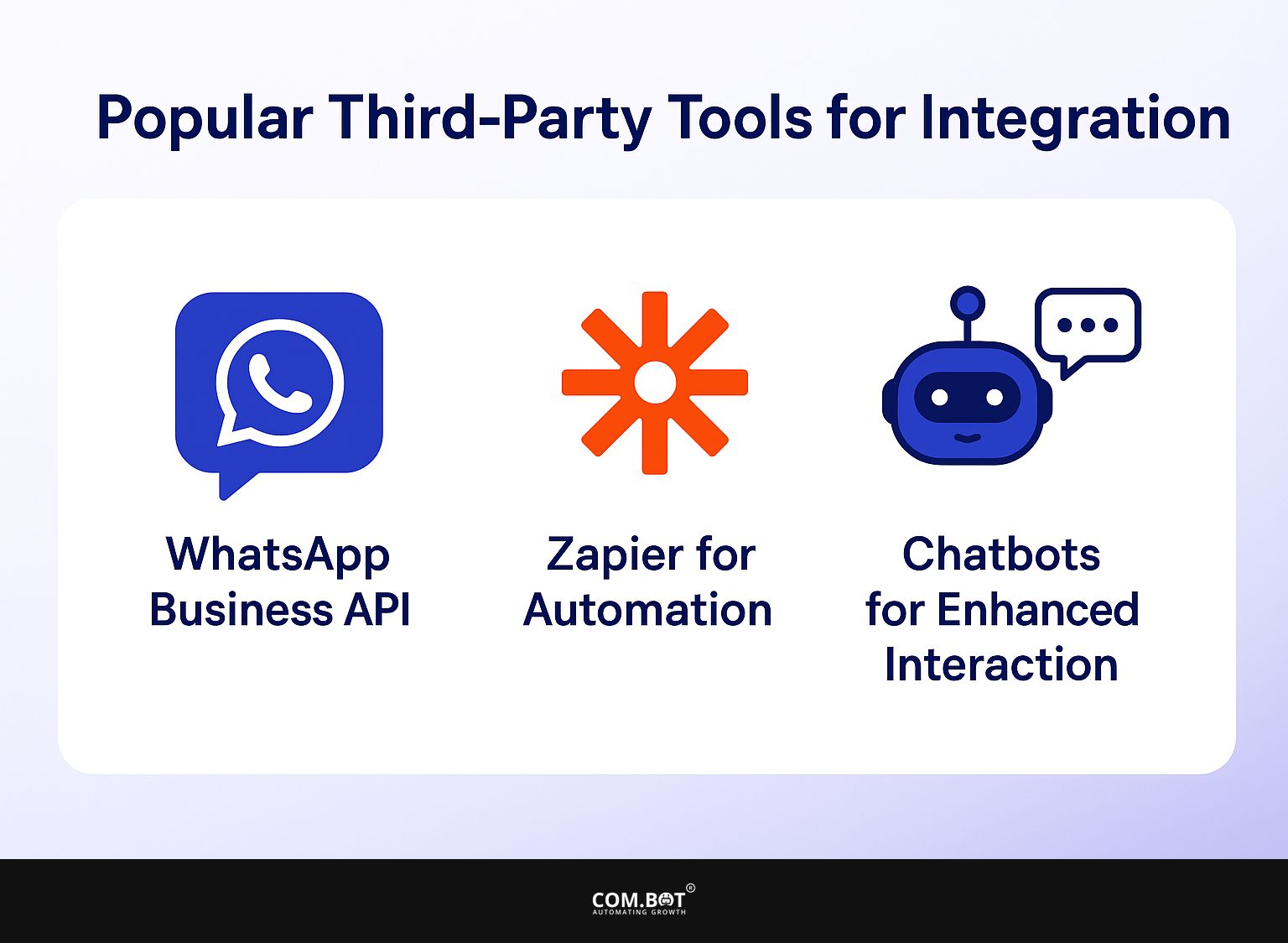
1. WhatsApp Business API
The WhatsApp Business API enables businesses to send automatic messages and reply to many customers, helping them interact better and work more smoothly.
To get started, businesses need to apply for access through WhatsApp’s partner companies, which can involve a verification process. The cost varies based on message volume; typically, it ranges from $0.005 to $0.09 per message.
For example, companies like Uber and Shopify have effectively used the API to send order updates and notify customers, which has greatly improved user satisfaction.
By setting things up correctly, businesses can make it easier to handle questions and provide quick replies, giving them an advantage in talking with customers.
2. Zapier for Automation
Zapier makes it easy to set up workflows between WhatsApp and different CRM systems, helping businesses organize tasks with little coding. To configure automatic processes, first make a Zapier account and connect your WhatsApp and CRM.
For example, configure a workflow to capture leads from a web form and automatically send a WhatsApp message to new contacts. You can also set up a follow-up system: when a lead is created in your CRM, Zapier can trigger a WhatsApp message thanking them for their interest.
This removes the need for manual input and improves response rates, making your sales process more efficient.
3. Chatbots for Enhanced Interaction
Adding chatbots to WhatsApp can greatly improve customer communication by offering immediate replies and support at any time. Platforms like ManyChat and Chatfuel offer user-friendly interfaces to design chatbots without coding.
A bot can answer frequently asked questions or solve typical problems, providing quick help for customers.
- For lead generation, consider setting up a qualification sequence that gathers user information before passing them to a human agent. For example, a fashion retailer’s chatbot might ask users about their style preferences to recommend products.
- Using chatbot analytics helps you track how users interact and make your responses better over time.
Best Practices for WhatsApp CRM Integration
Connecting WhatsApp with a CRM system is important for keeping customer trust and making sure everything runs smoothly.
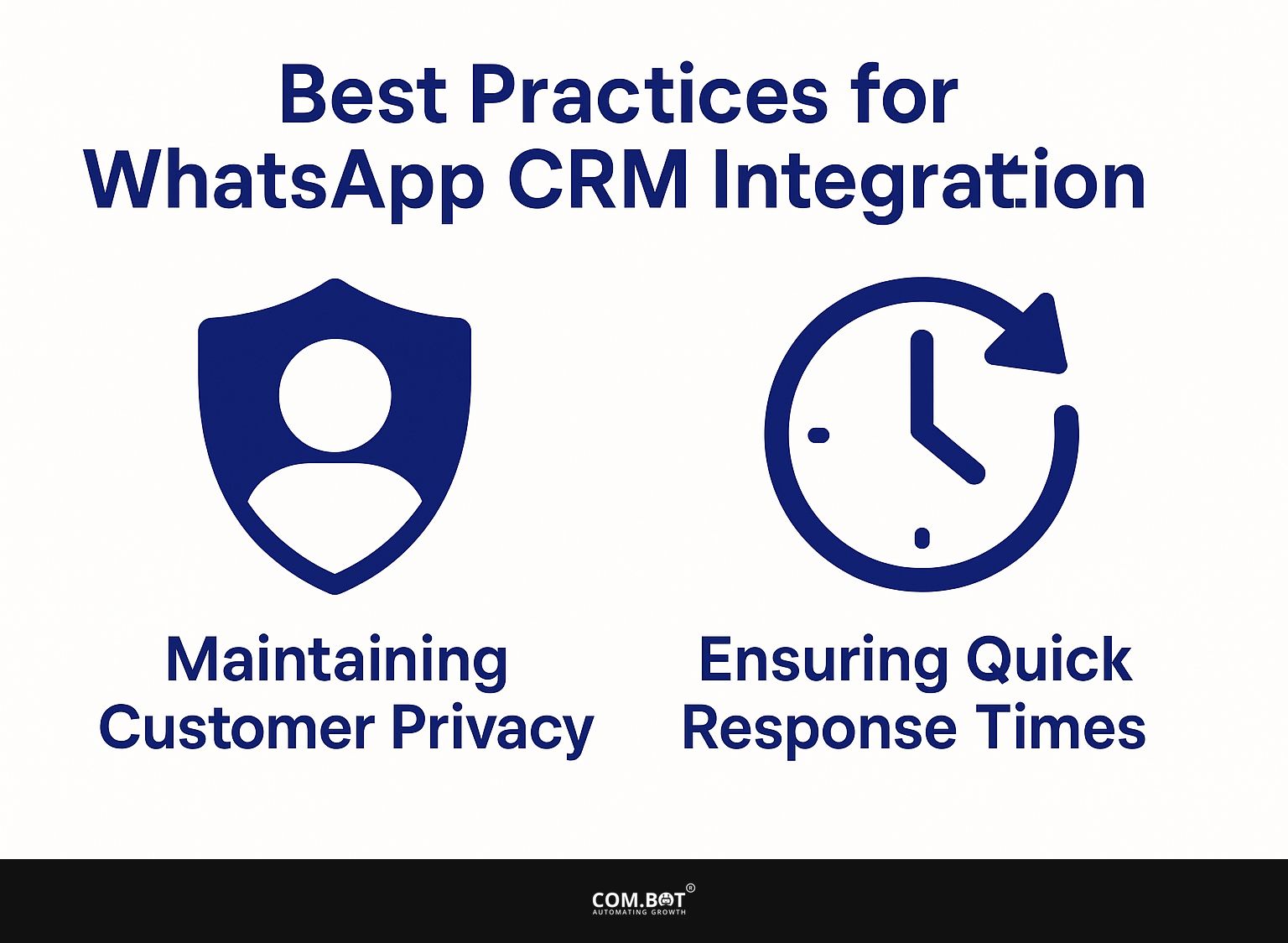
1. Maintaining Customer Privacy
Ensuring customer privacy is essential when using WhatsApp for business, especially in light of regulations such as GDPR. To protect customer data, businesses should obtain explicit consent before gathering personal information.
Implement double opt-in processes for subscriptions, ensuring customers agree twice. Use the complete encryption in WhatsApp to protect messages. Regularly revise your privacy policies to show how you currently operate, and review your data handling procedures from time to time.
Tools like LastPass can securely store and manage passwords, while software like Data Protection Manager can help follow data rules. These steps will improve security and increase customer trust.
2. Ensuring Quick Response Times
Responding quickly on WhatsApp is important for connecting with customers and affects their happiness and loyalty. To make responses quicker, think about setting up automatic replies for common questions so customers get a quick response.
Tools like WhatsApp Business allow you to set up these auto-replies effectively. Train your team to identify and focus on busy inquiry times, adjusting their schedules to handle these peaks.
Incorporating a shared digital dashboard, such as Trello, can help assign incoming queries and track response times, promoting accountability and quicker resolutions. Using automated systems and targeted team training boosts involvement and enhances customer happiness.
Challenges and Limitations
Although WhatsApp CRM integration offers benefits, it also presents challenges such as meeting compliance rules and dealing with the difficult process of integration that companies must manage. However, for those curious about how WhatsApp’s broader functionalities might aid in overcoming these hurdles, our insights into WhatsApp Shop and Templates offer a valuable perspective.
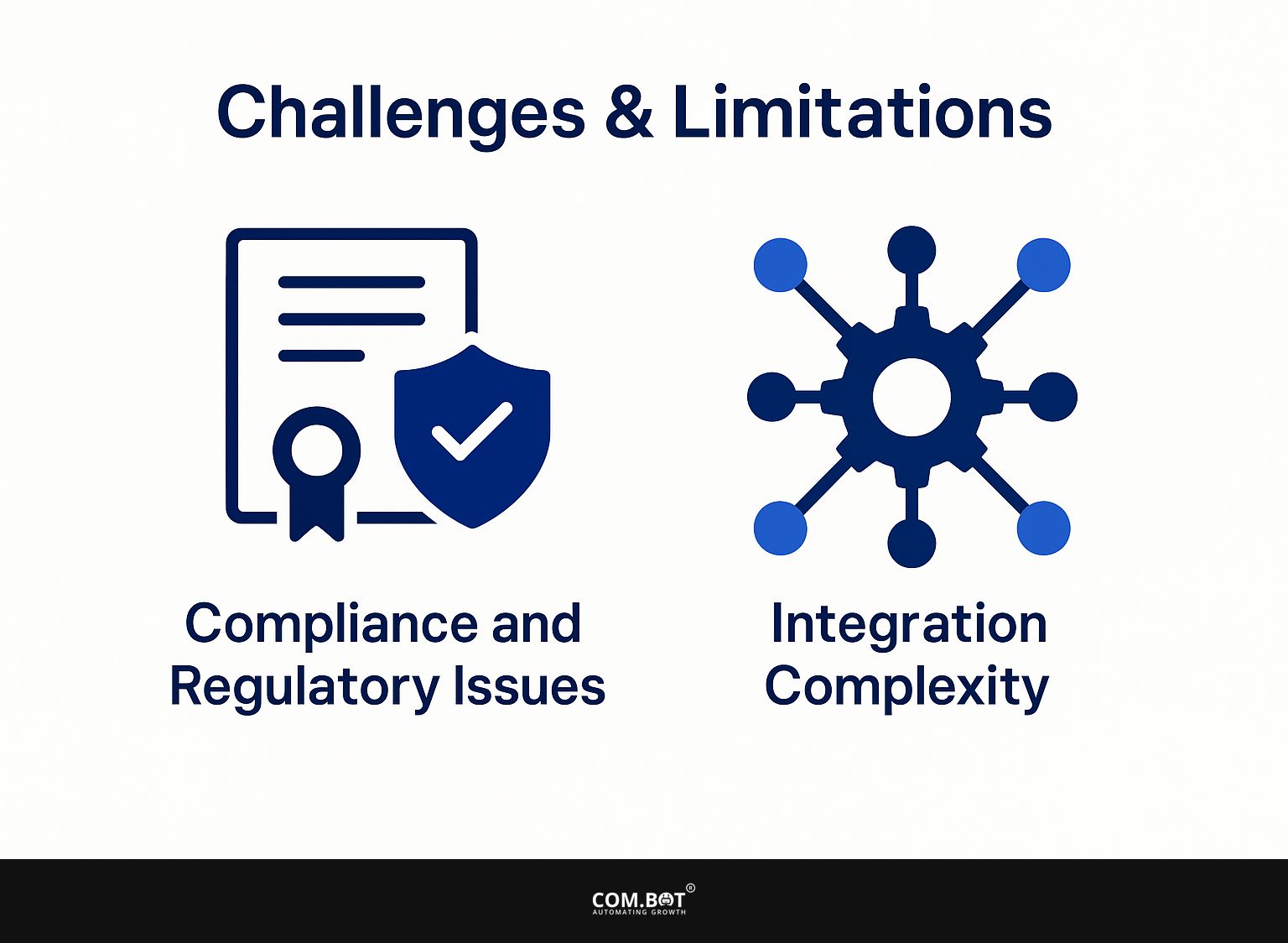
1. Compliance and Regulatory Issues
Businesses need to follow regulations like GDPR when using WhatsApp to talk with customers to avoid big fines.
- Start by obtaining explicit consent from customers before collecting or processing their personal data. You can use WhatsApp’s messaging feature to send an initial inquiry, asking if they agree to share their information for customer support.
- Implement data protection measures such as encrypting conversations and regularly reviewing data storage practices to maintain confidentiality.
- Use tools like OneTrust or TrustArc to make compliance tasks easier, helping you track consent and data usage.
- Make sure employees regularly learn about GDPR guidelines so they understand their responsibilities.
2. Integration Complexity
Connecting WhatsApp with current CRM systems can be complicated and may need technical skills and resources that some companies do not have.
To simplify this process, think about using middleware platforms like Zapier, which can link WhatsApp to widely used CRMs such as HubSpot or Salesforce.
For instance, you can set up a Zap that automatically logs WhatsApp messages as records in your CRM. Another option is to use Twilio for connecting to the WhatsApp API. This gives more options but may require programming.
Start by identifying your key use cases, such as customer support or lead generation, to tailor your integration effectively.
Frequently Asked Questions
1. What is WhatsApp CRM Integration and why is it important?
WhatsApp CRM Integration means linking your customer management software with the well-known messaging app, WhatsApp. It is important because it allows businesses to communicate with their customers in a more convenient and efficient way, improving overall customer satisfaction and retention rates.
2. What are some popular applications for WhatsApp CRM Integration?
Some popular applications for WhatsApp CRM Integration include Clickatell, WhatsApp Business API, and MessageBird. These applications offer different features and pricing options to suit the needs of different businesses.
3. Can WhatsApp CRM Integration be used with third-party tools?
Yes, WhatsApp CRM Integration can be used with third-party tools such as HubSpot, Salesforce, and Zoho. These tools make it simple for businesses to connect WhatsApp with their current CRM system, helping them handle customer messages more easily.
4. What are the benefits of using WhatsApp CRM Integration?
Connecting WhatsApp with a CRM helps improve how you talk to customers, makes work more efficient, and helps you learn what customers prefer and how they act. It also enables marketing efforts that focus on individual preferences and specific audiences.
5. Is WhatsApp CRM Integration suitable for all types of businesses?
Yes, WhatsApp CRM Integration can be beneficial for businesses of all sizes and industries. It can be very helpful for small and medium-sized businesses wanting to make their customer service and communication better. Larger companies can also benefit from making their customer management process more efficient.
6. How can I get started with WhatsApp CRM Integration?
To get started with WhatsApp CRM Integration, you can research and choose the best application or third-party tool for your business needs. You will then need to follow the integration process provided by the chosen tool. It is also important to train your employees on how to use the integrated system effectively.
